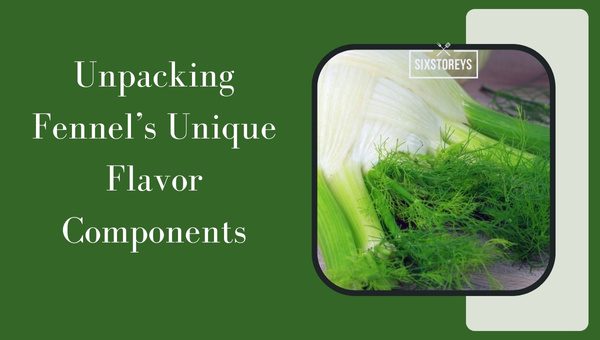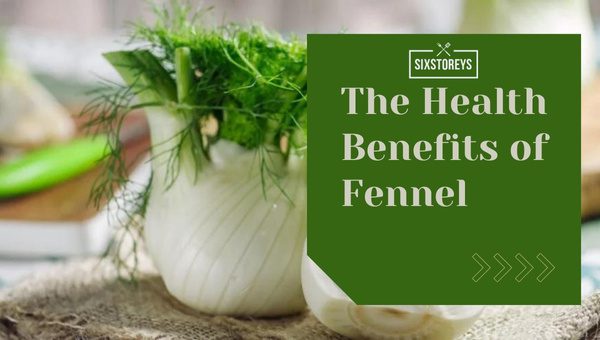What Does Fennel Taste Like? Beyond the Ordinary
Are you one of those adventurous culinary spirits eager to embark on the thrilling journey of discovering intriguing new flavors? Have you ever had a recipe call for fennel and standing there in the grocery aisle, found yourself wondering: "What does fennel taste like?" As someone who has bounded down this path of taste discovery numerous times, I can tell you it's worth satisfying your curiosity about this unique and versatile ingredient.
Fennel, a light green bulb with a leafy top, garners its fame not only for its distinctive flavor but also its cultural significance and health benefits. So, together, let's delve deep into the world of fennel, to better understand its taste and the best ways to incorporate it into your culinary repertoire.
Also Read: What Does Rutabaga Taste Like?
Article Includes
What Does Fennel Taste Like?

Fennel imparts an intriguing mix of flavors that conjures up images of warm Mediterranean afternoons. For anyone tasting it for the first time, fennel’s flavor is primarily a blend of anise or licorice with a grassy undertone, all wrapped up in a faint sweetness.
Flavors that Evoke Anise or Licorice
Beginning with the subtle backdrop of our flavor journey, the anise-like taste. You might be familiar with the anise seed or preferred star anise in your mulled wine or biryani. That's the one I'm talking about—the sweet, slightly spicy, aromatic flavor that gives fennel its distinctive character.
The Grassy Undertone
But it's not just anise. There's also this grassy undertone, which comes through the more you chew. It's kind of like celery but more refined and sophisticated, intermingled with that sweet, herby anise flavor. It gives fennel a mild refreshing note that most find pleasant and palatable.
Embracing the Sweetness
As a finishing touch, prepare to meet a hint of natural sweetness that gets more prominent when fennel is roasted or sautéed. This tender sweetness helps balance out the anise flavor, making fennel truly unique.
Fennel's taste is no one-trick pony show—it’s a complex blend of flavors that tickle your palate in its unique way. Whether you crush its seeds into a sauce, roast it with root veggies, or munch on it raw in a salad, every dining venture with fennel promises to be an adventure in flavor.
The Fascinating History of Fennel
If we browse through the annals of history, fennel proves itself to be more than just a flavorful culinary ingredient. Its story traces roots back to ancient times, with mentions dating as far back as the days of the Greek Gods.
In fact, Greek mythology says that fennel was closely associated with Dionysus, the god of wine and revelry. The ancient Romans hailed it for its culinary and medicinal uses - from aiding digestion to freshening breath. Furthermore, the Puritans cherished fennel seeds as one of their coveted “meeting seeds" for their long church services, helping to keep hunger at bay.
Fennel, scientifically known as Foeniculum vulgare, is native to the Mediterranean region but has since spread throughout the world, prominent in cuisines from Italy, India, and the Middle East.
Its rich history finely weaves itself into the culinary fabric of these cultures, providing a unique flavor profile that’s captured the hearts and taste buds of food lovers around the world.
Unpacking Fennel's Unique Flavor Components

To really understand and appreciate fennel and its flavors, we need to understand its unique flavor components. Fennel is an aromatic herb with a flavor profile that can be quite surprising to the unacquainted palate.
The most defining characteristic of fennel's flavor is that it is distinctively anise-like. This is due to a compound known as anethole, which is largely responsible for the characteristic flavor of anise and similar herbs. However, fennel’s flavor is more complex and nuanced. It's not just singularly licorice-like, but has a slight sweetness, a dash of herbal bitterness, and a hint of earthiness.
The bulb, stalk, and leaves of the fennel plant each have slightly differing flavor profiles. The bulb delivers a clean, crisp texture and a mild flavor, while the stalks are more fibrous with an intense flavor. The feathery leaves, often used as a garnish, offer a light anise taste.
Fennel seeds, too, have their own story to tell. They’re more potent, packing a stronger punch of that licorice-taste that fennel is known for. Roasted, they add another layer of depth, providing a warm, toasted flavor that's both sweet and slightly spicy.
Unraveling the unique flavors of fennel may lead to some delicious surprise in your cooking. Once you’re accustomed to its taste, it might just be an ingredient you'll reach for again and again.
Ways to Include Fennel in Your Meals
Creating tantalizing dishes with fennel is not only a feast for the taste buds but also a stimulating treat for the creative mind. Owing to the versatile flavor profile of fennel, it can be included in a variety of dishes to enhance their taste and overall grandeur.
Start by trying roasted fennel as a side dish. Simply cut the fennel bulbs into quarters, drizzle with olive oil, season with salt and pepper, and roast until tender. The roasting process actually softens the inherent crispness of the vegetable and enhances its sweet undertones.
Another option is to use fennel in a refreshing salad. Thinly sliced fennel, tossed with arugula, orange slices, and a simple lemon vinaigrette, transforms into an invigorating and light side dish that perfectly complements any main entrée.
For soups and stews, fennel can be an excellent addition. It not only adds depth to the flavor bouquet but also contributes to the overall texture and visual appeal of the dish.
Lastly, don't forget about the fennel seeds. These little gems are common in several recipes ranging from Italian sausages to Indian curries. They can be toasted for a more robust flavor, or grounded and sprinkled over the dish to add an extra layer of flavor.
What Pairs Well with Fennel's Flavor?

In the world of gastronomy, pairing the right ingredients together is an art. Just like a good symphony, when the notes of various ingredients orchestrate together, the result can be nothing short of mesmerizing.
If we are talking about fennel pairing, let's start with proteins. Fennel's sweet and slightly earthy flavor enhances the taste of fish, especially salmon, and shellfish. It also goes well with pork and poultry, particularly when roasted or braised.
When it comes to vegetables, fennel forms a delightful combination with carrots, potatoes and beetroot. These vegetables’ inherent sweetness practically sings when paired with fennel.
In terms of fruits, citrus fruits, like oranges and grapefruits, partner especially well with the slight bitterness of fennel, striking a harmonious balance that leaves taste buds dancing with joy.
Also, fennel's aromatic charm duly enhances the herbal notes in fresh rosemary and thyme, which makes them a great pairing.
Wine enthusiasts, rejoice! Fennel's subtle sweetness and aromatic notes complement white wines like Sauvignon Blanc and Vermentino, accentuating their fruity and floral elements.
So go ahead, grab that fennel bulb during your next grocery run. Experiment with it. Dive into this experience of discovering what fennel can bring to your table. The unique taste of fennel might just surprise you, proving an inspiring springboard for your next culinary creation. Enjoy!
Balancing the Strength of Fennel's Flavor
Fennel has a bold and distinctive flavor that, while intriguing, can often seem overpowering if not balanced correctly. To the uninitiated, this robust character can be daunting. However, fear not, because I've got the lowdown on how to tame this flavorful beast to suit your palate.
- Firstly, when using fennel in your cooking, a little often goes a long way. It's a potent herb, and its flavor can dominate a dish if you're not careful. Start off by using small amounts and gradually add more to taste.
- Secondly, heat is a remarkable tamer of fennel's intense flavor. Sautéing or grilling fennel helps soften its taste and brings out its natural sweetness, making it far more palatable for those less familiar with its flavor profile.
- Lastly, fennel also pairs beautifully with certain other ingredients. Combining fennel with acidic ingredients like lemon or vinegar, or with complementary herbs such as thyme or basil, can effectively balance its strong undertones.
The Health Benefits of Fennel

The myriad health benefits of fennel are as intriguing as its taste. This unique vegetable carries a host of nutritional benefits that make it a fantastic addition to any diet.
Firstly, fennel is an excellent source of Vitamin C, an essential nutrient that aids in collagen production and has potent antioxidant properties. A single cup of fennel bulb provides nearly 20% of your daily recommended intake of this important vitamin.
Fennel is also rich in fiber, a nutrient crucial for optimal digestive health. Consuming fiber-rich foods like fennel can help regulate your digestive system and might even aid in weight loss by keeping you feeling fuller for longer.
Additionally, fennel contains significant amounts of potassium, a mineral that helps regulate blood pressure and heart health.
Above all, fennel is also known for its potential anti-inflammatory properties, thanks to the concentration of anethole, a compound which is believed to reduce inflammation and help prevent the onset of certain types of cancer.
While these benefits are impressive, it's important to remember that everyone’s nutritional needs are different. Therefore, if you're considering adding more fennel to your diet for health reasons, it's always wise to consult with a healthcare professional or a certified dietitian.
Fennel’s unique taste might take a bit of getting used to; yet, its impressive health benefits and the flavor balance it can bring to dishes make it a culinary adventure worth exploring.
Also Read: What Does Cottage Cheese Taste Like?
Frequently Asked Questions
Is there a difference in flavor between fennel bulb and its seeds?
Yes, there is. Fennel bulb has a mild, sweet flavor with a slight crunch. On the other hand, fennel seeds tend to be more pungent and have a stronger anise-like flavor.
I've heard fennel tastes like licorice. Is that accurate?
Fennel does have an anise-like flavor that can be reminiscent of licorice, but it's not as strong or overwhelming. And unlike licorice candy, fennel also has a fresh, earthy undertone.
I'm not really fond of the taste of licorice. Will I still like fennel?
Possibly yes! While fennel does have a hint of anise, it's also sweet and earthy. And, it's amazing how different it can taste depending on how you prepare it. Roasting fennel, for example, tends to bring out its sweetness and subdue the anise flavor.
How can I incorporate fennel into my cooking?
Fennel is incredibly versatile and can be used in a variety of ways. You can slice it thin and use it raw in salads, roast or grill it as a side dish, or sweat it down as a base for soups and stews. The fronds can be used as a garnish or added to salads for a little extra flavor.
Conclusion
Unearthing the flavor nuances of fennel has certainly been an intriguing journey. It's a vibrant symphony of tastes that bridges the gap between subtly sweet and delightfully aromatic. Giving fennel a chance to shine in your meals could introduce a surprising depth of flavor you never knew you were craving. From its rich history to its nutritional profile and its versatility in culinary, fennel is without a doubt worth exploring. As we've discovered together, this bulbous green plant is no ordinary ingredient!
Whether you're trying it for its health benefits or you're just intrigued by its unique flavor, I can confidently say that exploring the world of fennel can be one of the wonderful culinary adventures you'd ever embark on. Here's to expanding our palates and embracing the unexpected, one flavorful bite at a time!
